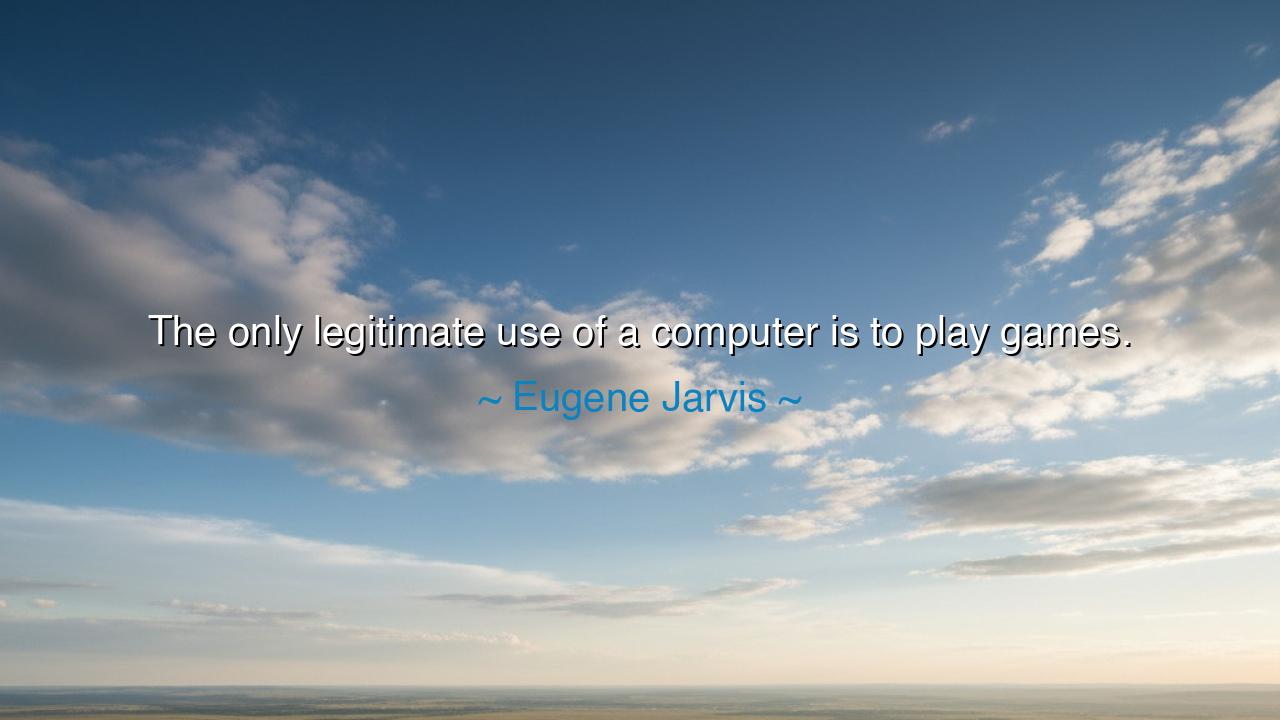
The only legitimate use of a computer is to play games.






Eugene Jarvis’ words, “The only legitimate use of a computer is to play games,” may at first seem to be a lighthearted or even flippant remark about the role of technology in our lives. However, beneath this seemingly casual statement lies a profound commentary on the human relationship with technology and the very nature of purpose in our existence. Jarvis’ perspective challenges us to reflect on the value of play, creativity, and human experience in the face of our modern obsession with productivity and utility. In a world where computers are often seen as mere tools for work, efficiency, and tasks, Jarvis invites us to consider that perhaps the true purpose of these machines is not to serve as instruments of work, but to enhance our joy, imagination, and humanity.
In the ancient world, the idea of play and games was not dismissed as frivolous, but was deeply tied to the spiritual and cultural fabric of society. The Greeks, for example, celebrated the Olympic Games, not simply as athletic contests, but as a way to honor the gods, bring the community together, and demonstrate human strength and virtue. Play, in the ancient sense, was a form of expression, a means of discovering the limits of the body, and an opportunity to celebrate life itself. In the context of Jarvis' quote, the idea of using computers for games can be seen as a way to reconnect with this ancient understanding of humanity, where play and creativity are as legitimate and necessary as any form of work or task.
Consider the story of Socrates, who, despite being one of the greatest philosophers of all time, was also known for his playful spirit. He believed in the power of dialogue—a form of intellectual play—to help people uncover the truth. In the same way, games on a computer, while often dismissed as entertainment, offer a platform for creative expression and even for the exploration of deeper ideas. Games, whether they are designed for fun or challenge, allow individuals to engage with ideas, strategies, and worlds that spark the imagination. They are not merely distractions but can become powerful tools for engagement, learning, and development.
The ancient Romans recognized the importance of play in shaping character and preparing individuals for the challenges of life. The famous story of Gladiators—while perhaps a more violent form of play—demonstrates the human drive to compete, to test one’s mettle, and to experience the thrill of life through the metaphor of combat. In the same way, video games offer a modern arena for people to test their skills, make decisions, and engage in experiences that challenge their courage, intellect, and strategy. Much like the ancient games that prepared the warrior for battle, digital games prepare the modern mind to face the challenges of the modern world, albeit in a different context.
Moreover, play is not simply a form of entertainment, but a method of engaging with the world in a way that is unburdened by the constraints of practicality. It allows for the creation of new realities, where the rules of the physical world do not apply. This is evident in the rise of virtual worlds, where players can escape the limitations of their bodies and explore realms governed by imagination and creativity. Just as the ancients had their theaters, where they could live out stories of tragedy and comedy, so too do we have our games, where we can explore complex narratives, take on new identities, and experience worlds far removed from our own.
Consider the rise of gaming as a culture in the modern world. It has become a force of global connection, bringing together millions of people across the world in shared experiences. The gaming community is a testament to how something as simple as play can bring meaning and connection to our lives. Games like Minecraft allow people to create, explore, and collaborate, building worlds and friendships that transcend physical borders. Jarvis’ quote speaks to this very power of play: that computers, when used for games, become not just tools of escape, but tools of connection and growth, fostering creativity and collaboration among people from every corner of the globe.
Yet, we must not ignore the larger implication of Jarvis' reflection—the legitimacy of play. In a world where we often prioritize productivity and work, play is often seen as a waste of time. However, history shows us that play—whether in the form of athletics, games, or theater—is not a diversion but a means of shaping the human spirit, engaging the intellect, and uniting societies. In fact, it is often in the moments of play and leisure that the most innovative ideas are born, as the mind is freed from the constraints of daily tasks.
Lesson for the ages:
Play is not simply the opposite of work—it is a vital and legitimate part of life that fuels creativity, growth, and connection. Just as the ancients valued games and play as a means of strengthening the individual and society, we must also recognize the importance of play in shaping our modern lives. The games we engage with, especially on computers, are not frivolous pursuits but legitimate tools for personal growth, imagination, and global connection.
Practical Action:
In your life, embrace the power of play. Allow yourself to engage with games not only for entertainment but as a way to explore, create, and connect. Recognize that play is not a waste of time but a powerful force for development and expression. Whether through video games, sports, or other forms of play, integrate these experiences into your life and use them to cultivate creativity, connection, and personal growth. Just as the ancients saw value in the games of their time, so too should we recognize the profound role that computers and games play in shaping the future of human experience.






AAdministratorAdministrator
Welcome, honored guests. Please leave a comment, we will respond soon